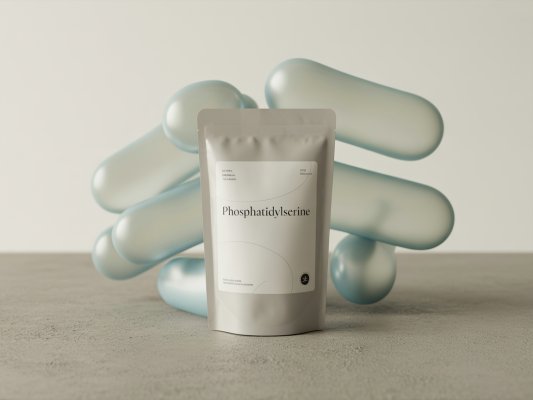
Phosphatidylserine
Description
Phosphatidylserine is a vital fatty substance called a phospholipid, an essential building block for cell membranes throughout your body, and is particularly concentrated in the brain; it has been researched for its cognitive benefits for several decades. It works by supporting the structure and function of brain cells, facilitating communication between them, which is crucial for processes like memory formation and recall. Numerous studies, especially in older adults, suggest that phosphatidylserine supplementation can improve cognitive functions, including short-term memory, attention, and problem-solving skills.
Categories & Effectiveness
Brain Health
Acetylcholine Support
7/10Strong evidence of effectiveness
Neuro-Repair Support
7/10Strong evidence of effectiveness
Synaptic Plasticity
4/10Moderate evidence of effectiveness
Cognition
Memory & Recall
7/10Strong evidence of effectiveness
Mental Acuity
7/10Strong evidence of effectiveness
Concentration & Focus
4/10Moderate evidence of effectiveness
Working Memory
4/10Moderate evidence of effectiveness
Mood & Stress
Mood Elevation
4/10Moderate evidence of effectiveness
Systemic Health
Anti-Inflammatory (Systemic)
4/10Moderate evidence of effectiveness
Cellular Anti-Aging
4/10Moderate evidence of effectiveness
Cellular Repair
4/10Moderate evidence of effectiveness
Recommended Products
Now Foods, Phosphatidylserine, 100mg, 120 vegane Kapseln, Laborgeprüft, Sojafrei, Glutenfrei, Vegetarisch, Ohne Gentechnik
- Rated 5.0 stars by 4 customers
- Premium quality ingredients
Phosphatidylserine 100mg, 240 Kapseln – Unterstützung für Gedächtnis & kognitive Funktion – Reine Zutaten, GMO- & Glutenfrei von Raw Powders
- Rated 4.8 stars by 8 customers
- Premium quality ingredients
Phosphatidylserin 300mg Hilft, Cortisol zu Reduzieren, Gedächtnis und Konzentration zu Verbessern, Stress zu Bewältigen, Nootropisches mit den Vitaminen B1, B6, B12 und Folsäure - 60 Kapseln Me Myeasy
- Rated 4.4 stars by 120 customers
- Special offer: Spare 5 % mit Rabattgutschein
As an Amazon Associate we earn from qualifying purchases. Prices and availability are accurate as of the date/time indicated and are subject to change.
Dosage & Side Effects
Recommended Dosage
Potential Side Effects
Bioavailability & Half-Life
Interactions & Stacks
Benefits by Use Case
Memory Enhancement
Supports short-term memory and recall, particularly in older adults with cognitive decline. Consistent supplementation over weeks or months is often needed to observe significant benefits.
Cognitive Support in Aging
Helps maintain overall cognitive function and may slow age-related cognitive decline by supporting brain cell membrane health. Effects are most notable in individuals already experiencing some cognitive impairment.
Stress Reduction & Mood
May help reduce the body's stress response and support a more balanced mood, potentially by modulating cortisol levels and supporting neurotransmitter function. Effects on mood may be more subtle than direct anxiolytics or antidepressants.
ADHD Symptom Management
Some studies suggest it may help improve attention and reduce hyperactivity symptoms in children with ADHD. It is generally considered as an adjunctive or supportive therapy rather than a primary treatment.
Exercise Recovery
May aid in reducing muscle soreness and improving hormonal balance (e.g., cortisol response) after intense exercise. More research is needed to fully establish its efficacy for athletic performance and recovery.
Where to Buy Phosphatidylserine
Based on quality, price, and customer reviews, here are our top recommended Phosphatidylserine supplements:
Phosphatidylserin 150mg (aus Soja) 120 Vegan Kapseln, Laborgeprüft, Hochdosiert, Nicht GVO
- Rated 4.3 stars by 475 customers
- Premium quality ingredients
Phosphatidylserin 300mg Hilft, Cortisol zu Reduzieren, Gedächtnis und Konzentration zu Verbessern, Stress zu Bewältigen, Nootropisches mit den Vitaminen B1, B6, B12 und Folsäure - 60 Kapseln Me Myeasy
- Rated 4.4 stars by 120 customers
- Special offer: Spare 5 % mit Rabattgutschein
Phosphatidylserine + Ginkgo Biloba + Ashwagandha 250mg 90 Vegan Kapseln, Laborgeprüft, Hochdosiert, Nicht GVO
- Rated 4.1 stars by 44 customers
- Premium quality ingredients
As an Amazon Associate we earn from qualifying purchases. Prices and availability are accurate as of the date/time indicated and are subject to change.
Mechanism of Action
Frequently Asked Questions
Summary & Expert Opinion
Complementary Products
These products pair well with Phosphatidylserine for enhanced benefits:
USDA Premium Black Seed Oil Organic Cold Pressed, 100% Pure Unrefined, Rich in TQ & Omega 3 6 9, Black Cumin Oil liquid for Skin Health Hair Care - Glass Bottle, 2 * 2 fl oz
- Rated 4.3 stars by 5 customers
- Special offer: Save 30% with coupon
Benefit when paired: Phosphatidylserine is often stacked with omega-3 fatty acids like DHA and EPA, or with Ginkgo Bil...
Focus Patch | with Bacopa Monnieri, Green Tea & Ginkgo Biloba | 10 Patches
- Rated 4.0 stars by 2 customers
- Premium quality ingredients
Benefit when paired: Phosphatidylserine is often stacked with omega-3 fatty acids like DHA and EPA, or with Ginkgo Bil...
USDA Premium Black Seed Oil Organic Cold Pressed, 100% Pure Unrefined, Rich in TQ & Omega 3 6 9, Black Cumin Oil liquid for Skin Health Hair Care - Glass Bottle, 2 * 2 fl oz
- Rated 4.3 stars by 5 customers
- Special offer: Save 30% with coupon
Benefit when paired: Phosphatidylserine is often stacked with omega-3 fatty acids like DHA and EPA, or with Ginkgo Bil...
As an Amazon Associate we earn from qualifying purchases. Prices and availability are accurate as of the date/time indicated and are subject to change.











